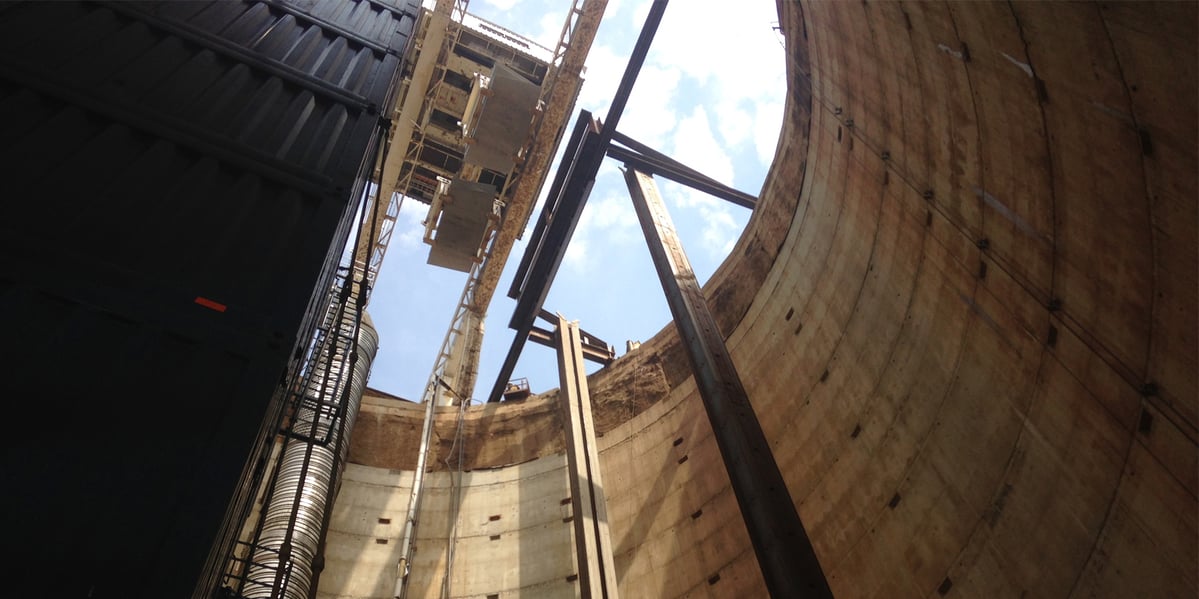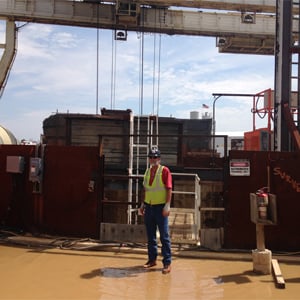
- Nine types of Tsurumi pumps were used during the excavation of the Blue Plains Tunnel, which is the first phase of The D.C. Clean Rivers Project in Washington, D.C.
- Tsurumi’s LH311W submersible dewatering pump can maintain a higher head using less horsepower than many competing pumps, which made it ideal for removing groundwater throughout the tunnel’s excavation.
- The LH311W’s high-chrome cast iron impellers enabled it to handle the concrete slurry that is created during the tunnel-boring process.
A host of Tsurumi pumps have contributed to The D.C. Clean Rivers Project in Washington, D.C., a massive infrastructure project that will capture the combined sewer overflows (CSOs) that are wreaking havoc on the region’s waterways. The project involves the construction of four tunnels that will divert the CSOs for wastewater treatment before they reach the capital city’s rivers.
The first phase of the ambitious program was the Blue Plains Tunnel Project, where Tsurumi pumps were at the center of the action. A massive excavation was needed to construct the 23,600 ft tunnel that measures 23 ft in diameter and runs more than 100 ft below the surface. The completed tunnel extends from the Blue Plains Wastewater Treatment Plant past Joint Base Anacostia-Bolling to a main pumping station on the north bank of the Anacostia River, just south of Nationals Park. Nine types of Tsurumi pumps removed water and moisture from the tunnel as crews constructed the piping system that now diverts the harmful CSOs.
J&K Equipment, based in Glenelg, Maryland, was the pump distributor responsible for supplying dewatering pumps and overseeing operations during the tunnel’s excavation. Jeff McKissack, vice president of J&K, said that he advised contractors on the job to use Tsurumi pumps based on their durability and efficiency when handling high volumes of water while enclosed in tight spaces.
“I find that Tsurumi pumps can handle higher head using less horsepower,” McKissack explained. “The process of removing excess moisture from a shaft as its excavated is a rigorous job that requires non-stop pump usage. The LH311W submersible dewatering pump in particular can move nearly 200 gpm at the required 160 ft of head. When you consider that this pump can move that volume of water with a 15 hp motor and such a slim design, you can really appreciate the level of engineering Tsurumi has maintained throughout its product line.”
Along with the LH311W three-phase portable dewatering pump, J&K also used a range of Tsurumi pumps that includes:
- 30 hp LH422 three-phase dewatering pumps
- 5 hp KTV2-37H three-phase dewatering pumps
- 5 hp KTZ33.7-60 three-phase portable dewatering pumps
- 3 hp NK2-22 single-phase dewatering pumps
- 1 hp LB-800 single-phase dewatering pumps
- 2/3 hp LB-480 single-phase dewatering pumps
- 1/2 hp HS2.4S-62 single-phase agitator pumps
- 2/3 hp LSR2.4S-61 residue pumps
As a massive tunnel boring machine—dubbed “Lady Bird” by engineers—made its way along the tunnel’s path some 100 ft underground, Tsurumi pumps removed groundwater from the shaft. Concrete slurry was poured behind concrete support segments to construct the 23 ft-wide pipe through which CSOs would eventually travel. It’s here that the ruggedness and durability of Tsurumi pumps enabled the project to stay on schedule.
“While it’s never the intention, concrete slurry also gets removed through the pumps on a tunneling job like this,” McKissack explained. “This typically results in the pump being scrapped fairly quickly, but we were able to wear out four sets of impellers on one of our LH311Ws before having to replace the internal seal. Since the impellers in the Tsurumi pumps are made using high-chrome cast iron, they could withstand the toll.”
The narrow dimensions of the excavation tunnel also presented a challenge on the job site, but the compact nature of the LH311W submersible dewatering pump helped J&K to overcome tight quarters.
“Space always matters when you’re dealing with tunneling applications,” McKissack said. “Because of Tsurumi’s slimline design, the pumps don’t take up a lot of room in a sump that only measures between 10 in and 12 in of diameter. The 10 5/8 in-wide LH311W was particularly handy for this project, as it was able to fit into these tight spaces and still move a significant amount of water.”

Furthering D.C.’s cleanup cause
The Blue Plains Tunnel Project finished construction in July of 2015, but progress towards environmental conservation in Washington continues. Excavation of the Anacostia River Tunnel Project began in June of 2013 and is expected to finish in November of 2017. When completed, the tunnel will extend from Robert F. Kennedy Stadium in Northeast D.C. to the Poplar Point pumping station in Southeast D.C. It’s expected to reduce CSOs by 98 percent each year for the Anacostia River alone. It is the second of four proposed tunnels that will be constructed for The D.C. Clean Rivers Project.
“Tsurumi pumps have been instrumental in our success in the first phase of the D.C. Clean Rivers Project,” McKissack said. “The efficiency, toughness and space-saving design of these pumps have helped us greatly in keeping on schedule. I have no doubts that the second phase of the project will go just as smoothly.”
The team behind Lady Bird
Traylor Skanska Jay Dee (TSJD) was the joint venture contracting team in charge of operating the Lady Bird tunnel boring machine to construct the Blue Plains Tunnel. The team consisted of Traylor Brothers, an Evansville, Indiana-based heavy civil contractor; Skanska, a global construction group based in Stockholm, Sweden; and Jay Dee Contractors, a Livonia, Michigan-based firm that specializes in underground construction.
“We owe much of our success on the Blue Plains tunneling project to the suggestions made by Jeff and the rest of the team at J&K,” said Chet Simcoe, electrical superintendent for TSJD. “We found J&K Equipment to be the most responsive pump supplier and repair station we’ve used to date. All of the Tsurumi pumps performed well on the job, and Jeff’s willingness to guide us through every step of the engineering and design process really helped to ensure that solid performance.”
J&K Equipment was founded in 2005 by Kathleen and Jeff McKissack who serve as the company’s president and vice president, respectively. The Glenelg, Maryland-based firm is WBE-certified and supplies Tsurumi pumps to Maryland, Virginia and Washington, D.C. J&K offers services for a number of different infrastructure projects, including tunnels, bridges, high-rises and bypass jobs.
